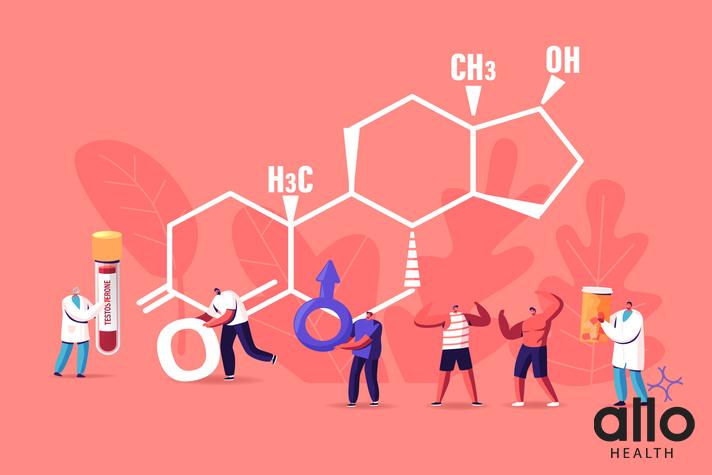How Sleep Deprivation Increases Levels Of The Hunger-Arousing Hormone?

Allo Health is dedicated to personalized well-being, offering support and trusted information tailored to individual health goals. The platform emphasizes human-generated content, led by a distinguished medical team of experts, including physicians and sexual health specialists. Their commitment to credibility involves rigorous fact-checking, authoritative research, and continuous updates to ensure accurate, up-to-date information. Allo Health's unique approach goes beyond conventional platforms, providing expert-led insights and a continuous commitment to excellence, with user feedback playing a crucial role in shaping the platform's authoritative voice.

Dr.Sushma.V completed MBBS degree from BGS GIMS,bangalore
Why This Was Upated?
Our experts continually monitor the health and wellness space, and we update our articles when new information became available.
Updated on 15 March, 2024
- Article was updated as part of our commitment to diversity, equity, and inclusion.

"The following blog article provides general information and insights on various topics. However, it is important to note that the information presented is not intended as professional advice in any specific field or area. The content of this blog is for general educational and informational purposes only.
Book consultation
The content should not be interpreted as endorsement, recommendation, or guarantee of any product, service, or information mentioned. Readers are solely responsible for the decisions and actions they take based on the information provided in this blog. It is essential to exercise individual judgment, critical thinking, and personal responsibility when applying or implementing any information or suggestions discussed in the blog."
Sleep deprivation disrupts the delicate balance of hormones regulating hunger, notably ghrelin, the hunger-arousing hormone. When sleep is inadequate, ghrelin levels rise, triggering increased appetite and cravings for high-calorie foods. This hormonal imbalance not only leads to overeating but also interferes with metabolism, potentially contributing to weight gain and obesity. Understanding the intricate connection between sleep and appetite regulation sheds light on the importance of prioritizing quality sleep for overall health and well-being.
The Science Behind Sleep And Hunger Hormones

- The science behind sleep and hunger hormones explores the intricate relationship between our sleep patterns and eating behaviors.
- Hormones like leptin and ghrelin play crucial roles in regulating hunger and satiety.
- Sleep deprivation can disrupt the balance of these hormones, leading to increased appetite and cravings for high-calorie foods.
- Conversely, adequate sleep promotes the proper functioning of these hormones, helping to regulate appetite and maintain a healthy weight.
- Understanding the science behind these hormones can inform strategies for improving sleep quality and managing weight effectively.
How Lack Of Sleep Affects Your Hunger Levels
- Lack of sleep can disrupt the hormones that regulate hunger, leading to increased appetite.
- Ghrelin, the hormone that stimulates appetite, is increased when you’re sleep-deprived.
- Leptin, the hormone that signals fullness, is decreased with lack of sleep.
- This hormonal imbalance can lead to overeating and weight gain.
- Sleep deprivation can also affect food choices, leading to a preference for high-calorie, high-carb foods.
- Poor sleep can also decrease insulin sensitivity, which can contribute to weight gain and diabetes risk.
- Getting enough sleep is important for maintaining a healthy weight and overall health.
The Role Of Ghrelin In Appetite Regulation
- Ghrelin is a hormone produced mainly in the stomach and known as the “hunger hormone.”
- It plays a key role in stimulating appetite and increasing food intake.
- Ghrelin levels typically rise before meals and decrease after eating.
- Low levels of ghrelin are associated with feelings of fullness and satiety.
- Ghrelin signals the brain to increase appetite and initiate feeding behavior.
- It interacts with the hypothalamus, a brain region involved in appetite regulation.
- Imbalances in ghrelin levels can contribute to overeating and weight gain.
- Understanding ghrelin’s role helps in developing strategies for appetite control and weight management.
Understanding The Hunger Hormone, Ghrelin

- Ghrelin is a hormone primarily produced in the stomach.
- It’s known as the “hunger hormone” because it stimulates appetite.
- Ghrelin levels increase before meals and decrease after eating.
- The hormone signals the brain’s hunger centers, stimulating hunger and promoting food intake.
- Ghrelin also affects the reward centers of the brain, influencing food preferences.
- Stress, sleep deprivation, and certain medications can affect ghrelin levels.
- Imbalances in ghrelin are linked to overeating, weight gain, and obesity.
- Understanding ghrelin’s role helps in developing strategies for appetite control and weight management.
Sleep Loss And Increased Ghrelin Production
- Sleep loss disrupts the balance of hormones involved in appetite regulation.
- Ghrelin, the “hunger hormone,” is particularly affected by sleep deprivation.
- Studies have shown that sleep loss leads to increased ghrelin production.
- Elevated ghrelin levels stimulate appetite and promote overeating.
- Sleep-deprived individuals may experience stronger cravings for high-calorie foods.
- The increase in ghrelin production contributes to weight gain and obesity.
- Chronic sleep deprivation can lead to long-term imbalances in ghrelin levels.
- Prioritizing sufficient and quality sleep is crucial for maintaining hormonal balance and managing appetite.
The Link Between Sleep Deprivation And Overeating
- Sleep deprivation disrupts the balance of hormones that regulate appetite.
- Ghrelin, the hormone that stimulates hunger, increases with sleep loss.
- Elevated ghrelin levels lead to stronger feelings of hunger and increased food intake.
- Leptin, the hormone that signals fullness, decreases with sleep deprivation.
- Reduced leptin levels make it harder for the body to recognize when it’s full.
- Sleep-deprived individuals tend to crave high-calorie, high-carbohydrate foods.
- Overeating due to sleep deprivation can contribute to weight gain and obesity.
- Prioritizing adequate sleep is essential for maintaining a healthy weight and managing appetite.
Effects Of Chronic Sleep Deprivation On Metabolism
- Chronic sleep deprivation disrupts the body’s metabolism and hormone balance.
- It leads to decreased insulin sensitivity, impairing the body’s ability to regulate blood sugar levels.
- Insulin resistance increases the risk of developing type 2 diabetes.
- Sleep loss also affects the hormones leptin and ghrelin, which regulate appetite.
- Decreased leptin levels and increased ghrelin levels can lead to overeating and weight gain.
- Sleep-deprived individuals may experience slower metabolism, making it harder to burn calories.
- Chronic sleep deprivation is associated with an increased risk of obesity and metabolic disorders.
- Prioritizing sufficient and quality sleep is crucial for maintaining a healthy metabolism.
Can Better Sleep Habits Reduce Cravings For Junk Food?
- Better sleep habits can reduce cravings for junk food by stabilizing hormones that regulate appetite.
- Adequate sleep helps maintain balanced levels of ghrelin, the hunger hormone, and leptin, which signals fullness.
- Improved sleep quality and duration can lead to fewer fluctuations in these hormones, reducing cravings.
- Establishing a consistent sleep schedule and creating a relaxing bedtime routine can promote better sleep habits.
- Prioritizing sleep hygiene, such as limiting screen time before bed and creating a comfortable sleep environment, can also contribute to reduced cravings for junk food.
Tips For Improving Sleep Quality To Curb Appetite
- Maintain a consistent sleep schedule by going to bed and waking up at the same time every day.
- Create a relaxing bedtime routine to signal to your body that it’s time to wind down.
- Limit exposure to screens and bright lights before bedtime to promote the production of sleep-inducing hormones.
- Keep your bedroom dark, quiet, and cool to create an optimal sleep environment.
- Avoid consuming caffeine and heavy meals close to bedtime, as they can disrupt sleep.
- Incorporate regular physical activity into your routine, but avoid vigorous exercise close to bedtime.
- Consider relaxation techniques such as deep breathing or meditation to reduce stress and promote better sleep.
How To Manage Ghrelin Levels For Weight Management
- Eat regular, balanced meals to help regulate ghrelin production and maintain stable blood sugar levels.
- Include protein-rich foods in your diet, as they can help reduce ghrelin levels and promote feelings of fullness.
- Avoid extreme calorie restriction, which can lead to increased ghrelin production and overeating.
- Prioritize sufficient and quality sleep to prevent disruptions in ghrelin levels.
- Manage stress through relaxation techniques such as deep breathing or meditation, as stress can increase ghrelin levels.
- Stay hydrated by drinking plenty of water throughout the day, as dehydration can also lead to increased ghrelin production.
- Consider consulting a healthcare professional for personalized advice on managing ghrelin levels and weight.
The Connection Between Poor Sleep And Obesity
- Poor sleep disrupts the balance of hormones that regulate appetite, such as ghrelin and leptin.
- Sleep deprivation leads to increased ghrelin production, stimulating appetite and promoting overeating.
- Decreased leptin levels make it harder for the body to recognize when it’s full, contributing to overeating.
- Sleep-deprived individuals tend to crave high-calorie, high-carbohydrate foods, further promoting weight gain.
- Chronic sleep deprivation can lead to slower metabolism, making it harder to burn calories.
- Over time, these factors contribute to weight gain and obesity.
- Prioritizing sufficient and quality sleep is crucial for maintaining a healthy weight and preventing obesity.
Practical Solutions For Better Sleep Hygiene To Combat Weight Gain
- Establish a consistent sleep schedule by going to bed and waking up at the same time every day.
- Create a relaxing bedtime routine to signal to your body that it’s time to wind down.
- Limit exposure to screens and bright lights before bedtime to promote the production of sleep-inducing hormones.
- Keep your bedroom dark, quiet, and cool to create an optimal sleep environment.
- Avoid caffeine and heavy meals close to bedtime, as they can disrupt sleep.
- Incorporate regular physical activity into your routine, but avoid vigorous exercise close to bedtime.
- Practice stress-reducing techniques such as deep breathing or meditation to promote better sleep.
The Vicious Cycle Of Poor Sleep And Unhealthy Eating Habits
- Poor sleep disrupts the balance of hormones that regulate appetite, increasing hunger and cravings for unhealthy foods.
- Sleep-deprived individuals are more likely to consume high-calorie, high-carbohydrate foods to satisfy cravings and provide quick energy.
- These unhealthy eating habits can lead to weight gain and obesity over time.
- Excess weight can exacerbate sleep concerns, such as sleep apnea, further disrupting sleep quality.
- Sleep deprivation also impairs decision-making and self-control, making it harder to resist unhealthy food choices.
- This creates a vicious cycle where poor sleep leads to unhealthy eating habits, which in turn worsen sleep quality and perpetuate the cycle.
Simple Lifestyle Changes for Better Rest and Reduced Appetite
- Maintain a consistent sleep schedule by going to bed and waking up at the same time every day.
- Create a relaxing bedtime routine, such as reading or taking a warm bath, to signal to your body that it’s time to wind down.
- Keep your bedroom dark, quiet, and cool to create an optimal sleep environment.
- Limit screen time before bed to reduce exposure to blue light, which can disrupt sleep to prevent sleep apnea.
- Engage in regular physical activity during the day, but avoid vigorous exercise close to bedtime.
- Practice stress-reducing techniques such as deep breathing, meditation, or yoga to promote better sleep.
Most Asked Questions
-
How does sleep deprivation affect ghrelin levels in the body?
Sleep deprivation increases the production of ghrelin, the hunger-arousing hormone, leading to heightened feelings of hunger and appetite.
-
What are the consequences of elevated ghrelin levels due to lack of sleep?
Elevated ghrelin levels can lead to overeating, weight gain, and an increased risk of obesity and related health concerns.
-
How quickly does sleep deprivation impact ghrelin levels?
Studies have shown that even one night of sleep deprivation can result in elevated ghrelin levels, affecting appetite regulation.
-
Can improving sleep habits help lower ghrelin levels?
Yes, prioritizing sufficient and quality sleep through better sleep hygiene practices can help regulate ghrelin levels and reduce appetite.
-
Are there any other factors that contribute to the link between sleep deprivation and increased ghrelin production?
Yes, factors such as stress, lifestyle habits, and certain medications can also influence ghrelin levels, exacerbating the effects of sleep deprivation on appetite regulation.






































